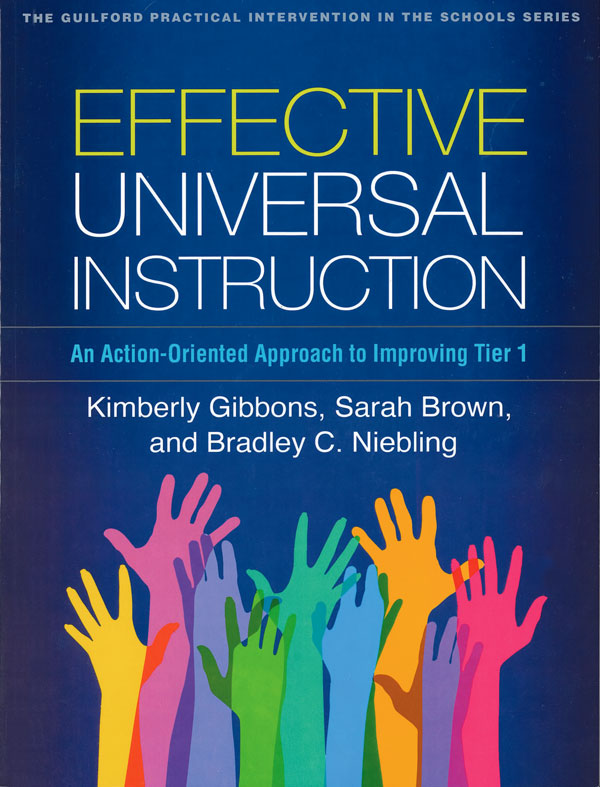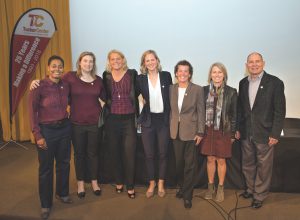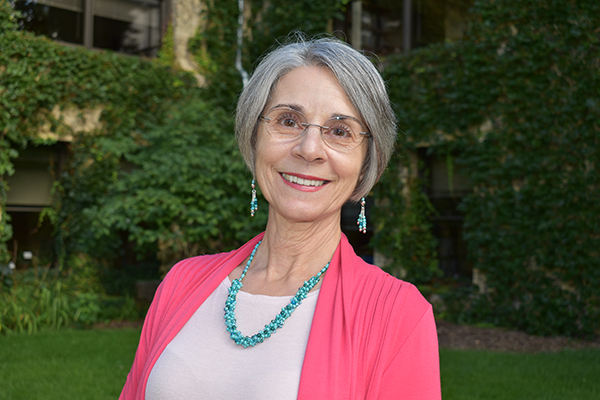Jane Piccard (MA ’73) discovered a tribute to her famous grandmother, Jeannette Piccard (PhD ’42), on the U of M Scholars Walk last fall when a friend noticed it and gave her a call. Jeannette Piccard is honored on the walk as the first woman to reach the stratosphere, which she accomplished as the pilot of a closed sphere that carried scientific instruments and her husband, Jean Piccard, in 1934. Jane lived for a few months with her grandmother while a student at the U herself, where she earned a BA in English and then a master’s degree in social work.
New book is a guide for universal instruction in K–12 schools

Kimberly Gibbons, director of the Center for Applied Research and Educational Improvement (CAREI), is the co-author of a new book, Effective Universal Instruction: An Action-Oriented Approach to Improving Tier 1(Guilford Press, 2019).
Part of a series about practical interventions in schools, Effective Universal Instruction explores improvements for Tier 1 instruction as a part of a Multi-Tiered System of Support (MTSS). It provides a guide for evaluating Tier 1 effectiveness, overcoming barriers to successful implementation, and creating and maintaining sustainable instructional improvements. The book also includes reproducible checklists, worksheets, and forms to make implementation easier for school leadership teams.
Gibbons directed the St. Croix River Education District in Minnesota before joining CAREI. Her co-authors are Sarah Brown, senior director of learning and development at FastBridge Learning in Minnesota, and Bradley C. Niebling, bureau chief for learner strategies and supports at the Iowa Department of Education.
Learn more about the Center for Applied Research and Educational Improvement and director Kim Gibbons.
China Champions learn and share experiences
Five Olympic and world champion athletes from China have been learning and sharing their experiences in Minnesota during the 2018-19 academic year as part of the China Champions Program, now completing its fifth year.
Weightlifting, boxing, skiing, and volleyball are the sports of this year’s cohort. Throughout the year, the athletes have attended specially designed courses in the School of Kinesiology, including academic seminars, workshops, and English as a second language classes. They’ve also visited Minnesota cultural sites and toured University and local professional sports teams’ stadiums, arenas, and training facilities.
Xia Liu is a three-time world record holder in weightlifting. She won two gold medals at the World Weightlifting Championships in Poland in 2002.
Shijin Wang received bronze medals at the World Boxing Championships in 2014 and 2016. She also won gold at the China Boxing National Championships in 2014, 2015, and 2016.
Also a boxer, Shiqi Xu won gold at the World Boxing Open Championship in 2013 and silver at the 2012 World Boxing Championships.
Yu Yang took home gold at the Freestyle Skiing Aerials World Cup Championships in 2012, 2013, and 2016.
Chen Zhang received gold medals at the National University Volleyball League Championships in 2016, 2017, and 2018.
Led by the School of Kinesiology in collaboration with Beijing Sport University and supported by the China Scholarship Council, the program is a unique, global collaboration that provides mutual benefits for Chinese athletes and University faculty, staff, and students.
Learn more about the China Champions Program, hosted by the School of Kinesiology.
Jeanne Nutter (MSW ’04)
When 13-year-old Jayme Closs escaped January 10 from a kidnapper after nearly three months in captivity in western Wisconsin, she ran to a woman walking her dog nearby. The woman was Jeanne Nutter (MSW ’04), who immediately brought Closs to safety and called 911. “I can tell you that I have never been so proud to call myself a social worker,” Nutter wrote to MSW program director Megan Morrissey when contacted. “This is what we do! Although I have not done direct practice in a long time, those skills stick with you. I cannot tell you nor thank the U of M enough for providing me with the foundation that enabled me to be the best I could be for Jayme. It was a huge privilege to play a small part in getting her to safety… Such amazing instructors I had.”
ITR News Roundup – March
ITR program news
The Institute for Translational Research in Children’s Mental Health (ITR) runs a number of programs, from research to implementation, meant to bridge the gap between research and practice in children’s mental health.
CPPR publishes special edition of the Journal of Prevention Science
ITR’s Center for Personalized Prevention Research recently published a special issue of the Journal of Prevention Science, titled “Moving Toward a Precision-Based, Personalized Framework for Prevention Science.” The special edition, curated by ITR core faculty members Gerald August and Abigail Gewirtz, is based on content from ITR’s 2016 symposium on the same topic. Read the issue here.
Cook awarded Article of the Year by School Psychology Review
ITR core faculty member Clay Cook received the Article of the Year Award from School Psychology Review for a paper he published with his colleagues on cultivating positive student-teacher relationships.
ADAPT program receives grant to expand work with military parents
ITR’s After Deployment: Adaptive Parenting Tools (ADAPT)program recently received a $1.1 million grant from the Bristol-Myers Squibb Foundation to implement the ADAPT program into Womack Army Medical Center’s primary care pediatric system. Womack is the medical system-of-care for Fort Bragg, North Carolina, the nation’s largest medical installation. To our knowledge, this would be the first time a parenting program would be integrated into a primary care system serving military families. The implementation process is scheduled to begin this summer.
Watch ITR colloquium with methodologist Danny Almirall
“Adaptive interventions” represent an exciting new frontier in evidence-based practices. A growing body of research shows that the effective prevention or treatment of a wide variety of health disorders often requires individualized, sequential decision-making. However, designing adaptive interventions requires new and different methods for developing and testing these programs.
To explore these questions, ITR recently hosted adaptive intervention expert Daniel Almirall as part of its 2019 colloquium series. Dr. Almirall is an expert in developing methods for adaptive interventions and has a deep body of work on new approaches to data collection and analysis. He is a research professor at the University of Michigan and co-director of the Data Science for Dynamic Intervention Decision-Making Lab.Watch Dr. Almirall’s talk here.
ADAPT’s Shauna Tiede honored at CEHD Spring Assembly
Shauna Tiede, assistant program manager for ITR’s APAPT program focused on military parenting, was recently honored with an Operational Excellence Award from the College of Education and Human Development.
Affiliated faculty news
ITR brings together leading faculty researchers from multiple disciplines whose explicit goal is to synergize their research expertise in unprecedented ways. This affords us the ability to seamlessly apply research findings in the lab, to experimental designs in the field, to evidence-based trainings across the state.
Rich Lee awarded Distinguished McKnight University Professorship
Affiliated faculty member Rich Lee was recently awarded the Distinguished McKnight University Professorship, which recognizes outstanding faculty members who have recently achieved full professor status.
Dr. Lee’s research focuses on the role of culture, race, and ethnicity in Asian American mental health and his groundbreaking, internationally recognized research has helped to establish the field of ethnic minority and cultural psychology. Read more.
Katie Lingras testifies to senate about training pediatric residents in children’s mental health
Affiliated faculty member Katie Lingras recently testified to the Minnesota Senate urging the legislature to fund training for pediatric residents for the treatment of adolescent mental health. The push is a collaboration between the University’s Department of Pediatrics and School of Psychology. Affiliated faculty member Andrew Barnes is also part of the project.
Faith Miller’s paper receives runner up for Article of the Year from Journal of School Psychology
Affiliated faculty member Faith Miller recently received the runner-up Article of the Year award from the Journal of School Psychology for a paper she published with her colleagues on methods for analyzing student behavior.
Alisha Wackerle-Hollman featured on Mom Enough podcast
Affiliated faculty member Alisha Wackerle-Hollman was recently featured on the popular Mom Enough podcast, discussing on effective language stimulation for children. The Minnesota-based Mom Enough organization provides motherhood resources to parents, medical professionals, and teachers. Listen here.
New research from Jeff Waid
Affiliated faculty member Jeff Waid focuses on the role of healthy family relationships in the development of favorable outcomes for children who are at risk of or are currently experiencing maltreatment. He has published two recent papers related to ITR’s work:
- Waid, J., & Uhrich, M. (2019). A scoping review of the theory and practice of positive youth development. British Journal of Social Work, 0, 1-20. doi:10.1093/bjsw/bcy130
- Waid, J., & Wojciak, A. (2019). Evaluating the impact of camp-based reunification on the resilience of siblings separated by foster care. Children and Youth Services Review, 100, 274-282. https://doi.org/10.1016/j.childyouth.2019.03.011
Events
Spring conference on cultural competence
ITR’s Ambit Network and Center for Resilient Families are hosting a spring conference focused on cultural competence in community practice. The half-day conference will take place June 27 and is targeted to mental health practitioners, organizational leaders, researchers and program developers. Learn more and RSVP here.
Upcoming workshop on “just-in-time” adaptive interventions
An upcoming meeting of the Research Society on Alcoholism in Minneapolis will focus on cutting-edge approaches to methods in research. The workshop, “Optimizing Just-In-Time Adaptive Interventions for Mobile Health” will take place June 21 with researchers Susan Murphy and Pedja Klasnja. Learn more about the meeting here.
2019 MN PBS Network Collaborators Forum
The Minnesota Positive Behavior Support Network Forum will bring together people working across sectors using implementation to support positive behavior supports across the lifespan. Learn more here.
CASCW spring conference announced
ITR partner Center for Advanced Studies in Child Welfare is hosting its 20th annual conference on April 30 and March 1 in Minneapolis. The title is “Understanding Substance Use and Interventions in Child Welfare.” Learn more here.
In memoriam: R. Michael Paige
Richard Michael Paige, associate professor emeritus of international and intercultural education, passed away on November 9 at the age of 75. Paige co-founded the innovative and ground-breaking comparative and international development education master’s and PhD programs in CEHD.

Paige was born in Madison, Wisconsin, and grew up in Los Angeles. After college, he served in the Peace Corps and worked as a Peace Corps trainer in Hawaii. He went on to receive a master’s and PhD from Stanford University before joining the University faculty in 1977. He first served as associate director of the international student adviser’s office and played a critical role in shaping what became International Student and Scholar Services.
Paige excelled at research and training. He contributed to several of the most renowned research studies on study abroad outcomes, including the landmark Study Abroad for Global Engagement (SAGE). His leadership was central to development of the Maximizing Study Abroad series of books and materials used around the world, which emphasize the role of intercultural and language learning in study abroad.
Over the years, Paige served as a gregarious adviser, colleague, and friend to many in the field of international and intercultural education. He was an instructor for the Intercultural Development Inventory (IDI) qualifying seminar, advised many graduate students in CEHD’s Department of Organizational Leadership, Policy, and Development, and worked with colleagues around the world to advance the field. In 2017, Paige received the University’s Award for Global Engagement: Distinguished Global Professor.
Paige is survived by his wife, Barbara King of Dallas, his brother Steven in California, and many more relatives and friends around the world. Services were held in Pennsylvania on February 22, and a celebration of his life for the Twin Cities community was held Sunday, March 31, 2019, in St. Paul.
His full obituary was published February 20.
Last update April 12, 2019.
2019 Ambit Conference: Cultural competency in community practice
WHAT: 2019 Ambit Network Conference:
“Cultural competency: Integrating cultural considerations into evidence-based models and community practice”
WHEN: Thursday, June 27, 8:30-12:30 p.m.
WHERE: McNamara Center, University of Minnesota, Minneapolis, MN
HOW MUCH: $25 (includes breakfast)
RSVP: z.umn.edu/competence
“Cultural competence” is becoming one of the most important topics in mental health practice. There is a rapidly growing awareness that effective care must be tailored to the cultural backgrounds of the families we serve.
However, it remains difficult to know where to begin. Many practitioners struggle to balance the benefits of following evidence-based practices with the importance of culturally tailoring our work.
To explore this important question, Ambit Network and the Center for Resilient Families at the University of Minnesota are hosting a half-day conference that will bring together leading voices on the topic from around the state and nation.
Attendees will learn practical tools for becoming more culturally competent in their work, which will improve their confidence and effectiveness in serving parents from diverse cultural backgrounds.
WHO SHOULD ATTEND:
- Mental health practitioners
- Organizational leaders
- Researchers and program developers
SPEAKERS INCLUDE:
- Keynote: Dr. Ruben Parra-Cardona, Developer of CAPAS, an adapted version of the Parent Management Training-Oregon Model tailored specifically to Latinx families
- Sue Abderholden, Executive Director, National Alliance on Mental Illness-Minnesota
- Cynthia Fashaw, Director of Multicultural Outreach & Children’s Programs, National Alliance on Mental Illness-Minnesota
- Johara Mohammed, Marriage and Family Practitioner
- Sonya Smith, Cultural and Linguistics Competence Lead, Minnesota Department of Human Services
RSVP today at z.umn.edu/competence
QUESTIONS?
Contact itr@umn.edu.
ABOUT AMBIT/CRF:
Ambit Network and the Center for Resilient Families, part of the Institute for Translational Research in Children’s Mental Health at the University of Minnesota, aim to bring evidence-based parenting practices into practice for parents across the country, and raise awareness about the importance of parenting. Learn more at crf.umn.edu.
ITR colloquium: Adaptive interventions with methodologist Danny Almirall
WHAT: Colloquium presentation: “Adaptive Interventions and Implementation Science in Child and Adolescent Mental Health”
WHEN: Monday, Feb. 25 from 3-4 p.m.

WHERE: Institute for Translational Research (free parking available)
1100 S Washington Avenue, Minneapolis (map)
“Adaptive interventions” represent an exciting new frontier in evidence-based practices. A growing body of research shows that the effective prevention or treatment of a wide variety of health disorders often requires individualized, sequential decision-making. However, designing adaptive interventions requires new and different methods for developing and testing these programs.
To explore these questions, the Institute for Translational Research in Children’s Mental Health is excited to host adaptive intervention expert Danny Almirall as part of its 2019 colloquium series. Dr. Almirall is an expert in developing methods for adaptive interventions and has a deep body of work on new approaches to data collection and analysis. He is a research professor at the University of Michigan and co-director of the Data Science for Dynamic Intervention Decision-Making Lab.
Attendees will have the chance to learn more about Dr. Almirall’s work on adaptive interventions and the most effective methods to test and optimize them.
Meet with Dr. Almirall
Interested researchers, including students, are invited to meet personally with Dr. Almirall while he is in town. He is available before and after the talk on Monday Feb. 25 as well as the following morning. A light lunch will be served beginning at 12:30 p.m. on Monday for students who would like to meet.
To schedule a time to meet with Dr. Almirall, contact Chris Bray at bray0021@umn.edu.
RSVP
Please RSVP by e-mailing itr@umn.edu. The event is free.
School-engagement method goes to Micronesia
In December, the student engagement method Check & Connect went to the Federation States of Micronesia, thanks to Eileen Klemm and Maureen Hawes from the Institute on Community Integration.
Klemm and Hawes spent December on the Pacific island of Yap meeting with lead special-education staff for the island and Micronesia and discussed a needs assessment of student engagement levels for training and implementation.
Check & Connect is a model developed in the 1990s to assist K–12 students who show signs of disengagement from school and learning. Founded in CEHD’s Institute on Community Integration, it has been implemented by educators in 45 U.S. states and several foreign countries, and the partnerships continue to grow.
Learn more about Check & Connect in Micronesia.
Inaugural First Generation Institute convenes 200 from across the U
Nearly 200 faculty, staff, and students from across the University convened November 2 for the inaugural First Generation Institute, hosted by CEHD. The theme was “Making an Institutional Commitment.”
The U of M Twin Cities is home to a significant first-generation student community, with 26.3 percent of undergraduates reporting that neither parent received a four-year college degree. Systemwide, more than one in four (29 percent) enrolled undergraduate students are the first person in their family to seek a bachelor’s degree across five U of M campuses.
CEHD’s first-generation-to-college population is even higher, including over 40 percent of entering freshmen in 2018. CEHD faculty and staff have developed expertise in helping them succeed.
The institute was designed to improve knowledge of the many intersecting identities of first-generation students and to highlight practices in and outside the classroom that can help bridge opportunity gaps for our students. It explored common challenges and opportunities for first-generation students. Sessions addressed topics including overcoming “imposter” phenomenon, the need to learn the “hidden curriculum” of norms and values in higher education, and complex identities for refugee and immigrant first-gen students.
“We hope this event serves as a catalyst for action around institutional partnerships that support and validate the experience and capital that first-generation students bring to our campus,” said professor Rashné Jehangir, First Generation Institute Coalition Committee and a member of the faculty in the Department of Organizational Leadership, Policy, and Development.
Learn more about the First Generation Institute.
Forming: Minnesota Implementation Network (MIN)
 From schools, to juvenile justice settings, to social services agencies, the rise of evidence-based practices has revolutionized how we serve kids. Unfortunately, adopting these programs isn’t as easy as choosing one from a list and snapping your fingers.
From schools, to juvenile justice settings, to social services agencies, the rise of evidence-based practices has revolutionized how we serve kids. Unfortunately, adopting these programs isn’t as easy as choosing one from a list and snapping your fingers.
ITR is forming the state’s first venue to connect with and learn from others doing similar work. Convened by ITR faculty members Dr. Clay Cook and Dr. LeAnne Johnson, the Minnesota Implementation Network (MIN) will provide support and guidance to navigate the many barriers to successful implementation.
Who it’s for
Anyone who implements or manages evidence-based practices to serve children and adolescents in service settings (schools, child welfare, juvenile justice, children’s mental health) and anyone who has a research interest in implementation science.
What you’ll get
- Better results from your evidence-based program(s)
- Guidance and support from peers and experts
- Networking, new partnerships, and research opportunities
- Chance to set priorities for research
Get involved
Contact bray0021@umn.edu to learn more or express interest.
ITR releases “Parenting Readiness” guide
Families dealing with trauma experiences often benefit from counseling services to help with healing. But with so many things to consider, it can be hard to decide if now is the right time or if it would be better to wait for some time to pass.
To address this need, the Institute for Translational Research in Children’s Mental Health (ITR) designed a brief worksheet for families to use. It is based on information shared by families about their own experiences. We hope going through this worksheet will help families make decisions about their readiness to start trauma counseling and feel more prepared when the time comes.
The worksheet is a collaboration between ITR, the Family-Informed Trauma Treatment Center at the University of Maryland, and National Child Traumatic Stress Network. View it at crf.umn.edu/readiness.
ITR 2019 seed grant award winners announced
ITR’s collaborative seed grant program supports small research projects that address important issues in children’s mental health that align with ITR’s mission, are identified by communities in Minnesota, and have a high likelihood of leading to external funding.
We are pleased to announce the four recipients of our seed grants for 2019:
Dr. Katie Lingras
Dr. Lingras’ project will extend her current partnership with the Ramsey County Head Start Programs to evaluate the short- and medium-term impacts of teacher training and consultation focused on early childhood mental health. The team is specifically interested in learning more about variables related to implementation that help to explain barriers and facilitators to embedding an evidence-based curriculum on social-emotional development and classroom management into a complex, real-world early childhood education system of many moving parts.
Dr. Christopher Mehus
In collaboration with Dr. Abi Gewirtz and Dr. Megan Patrick, Dr. Mehus will use data from the ADAPT trial (PI: Gewirtz) to investigate the links between parental alcohol use and multiple dimensions of parenting. To build on this further, Dr. Mehus will submit an NIH grant to examine the impact of parental alcohol use on intervention engagement and effectiveness.
Dr. Jeffrey Waid
Strengthening mental health service access and engagement among families at risk of child welfare intervention is a multi-phase study designed to fill a critical gap in the Minnesota child maltreatment prevention service continuum. ITR Seed Grant funds will provide support to Phase 2; a mixed-methods study designed to engage key stakeholders and identify key barriers and facilitators to mental health service access for Minnesota families.
Dr. Lindsey Weiler
This project, Evaluation of a Community Mentorship Program for Individuals with Autism Spectrum Disorder (ASD), will examine the feasibility and initial outcomes of the Autism Mentorship Program, a near-peer mentoring program that pairs young adults and adolescents with ASD in one-to-one mentoring relationships. This program is an important example of a community-university partnership that targets the quality of life, socio-emotional health, self-esteem, and social connectedness of those with ASD.
Tucker Center celebrates 25 years of advocacy for women and girls in sport
In 1993, the work of kinesiology professor Mary Jo Kane inspired alumna Dorothy McNeill Tucker, ’45, to make a gift of $1 million to found the Tucker Center for Research on Girls & Women in Sport.
Twenty-five years later, the new Gopher women’s basketball coaching staff drew a full house to Cowles Auditorium to celebrate the anniversary at this fall’s distinguished lecture, “Why Women Leaders Matter: Challenges and Opportunities for Female Head Coaches in Collegiate Sports.”

Former Gophers and now coaches Lindsay Whalen ’06, Kelly Roysland ’09, and Danielle O’Banion entertained and engaged the audience, answering questions from Kane about early influences, how and when they decided to coach, the transition from being an elite athlete to coaching, work–life balance, advice for young women who want to coach, and being a role model. Their range of replies provided a picture with depth.
Together they grappled with an unintended consequence of Title IX: the dramatic decline of women coaches—from 90 percent to 58 percent in just six years and now just 42 percent nationwide—while participation of women in sport went up in unprecedented numbers.
“I just thought women coached!” said Roysland, whose parents and grandmother all coached in Fosston, Minnesota. “I knew I could influence and empower other women.”
In contrast, O’Banion grew up in Virginia, without siblings, and learned to play in an after-school program when she was 7. She was first coached by a woman in high school, then in college.
“It’s been insanely valuable to be around women who have opinions,” said O’Banion. “It’s like a permission slip.”
Being a role model, said Whalen, is a goal.
“Thinking about those fourth and fifth graders out there watching is what it’s all about,” said Whalen. “You want to see the next generation of players be better. You want the next generation of coaches to be better.”
“The most rewarding thing is seeing what happens when they leave us,” said O’Banion. “It’s amazing.”
Former Gophers athletic director Joel Maturi spoke passionately about the need for awareness and commitment by leadership to hire and retain women coaches.
The Tucker Center is still one of a kind. It has sponsored 41 major lectures, five video projects, a media campaign about women’s sport coverage, boundary-breaking research projects, partnerships around the world, the Women in College Coaching Report Card since 2013, an annual Women Coaches Symposium since 2014, and dozens of influential reports and publications. It supports interns and students. Kane and renowned Tucker Center researcher Nicole LaVoi, PhD ’02, introduced the anniversary celebration and panel.
Read a Q&A with the Tucker Center team in CEHD’s Connect magazine.
CEHD ranks #4 among public universities in the world
 The University of Minnesota’s College of Education and Human Development has been recognized as the #4 public school of education in the Academic Ranking of World Universities’ 2018 college rankings. CEHD was ranked seventh overall, among private and public universities.
The University of Minnesota’s College of Education and Human Development has been recognized as the #4 public school of education in the Academic Ranking of World Universities’ 2018 college rankings. CEHD was ranked seventh overall, among private and public universities.
More than 1,200 universities are ranked by ARWU every year and the best 500 are published.
ShanghaiRanking Consultancy, an independent organization dedicated to research on higher education, has published ARWU rankings since 2009. ARWU uses six objective indicators to rank world universities, including the number of alumni and staff winning Nobel Prizes and Fields Medals, number of highly cited researchers selected by Clarivate Analytics, number of articles published in journals of Nature and Science, number of articles indexed in Science Citation Index – Expanded and Social Sciences Citation Index, and per capita performance of a university.
Chaudhuri quoted in Forbes article about reverse mentoring
 Sanghamitra Chaudhuri, lecturer in the Department of Organizational Leadership, Policy, and Development (OLPD), was quoted in a recent Forbes article titled “Reverse Mentoring: 3 Proven Outcomes Driving Change.”
Sanghamitra Chaudhuri, lecturer in the Department of Organizational Leadership, Policy, and Development (OLPD), was quoted in a recent Forbes article titled “Reverse Mentoring: 3 Proven Outcomes Driving Change.”
Drawing from Chaudhuri’s feature in a 2016 Star Tribune article on reverse mentoring, Forbes author Jason Wingard cites Chaudhuri’s research when talking about how companies should approach reverse mentoring with a purpose in mind and that the most effective programs are “tied to a strong business need.”
Announcing ITR’s fall symposium on innovations in implementation science
Innovations in Implementation Science: Bridging the Science to Practice Gap across Community Systems of Care
October 4 & 5, 2018 | Minneapolis, MN
RSVP: z.umn.edu/2018symposium
Over the past several decades, there have been enormous breakthroughs in our understanding of how to improve children’s mental health. However, many of these interventions—which research teams can spend entire careers and millions of dollars developing—make it into the hands of practitioners at alarmingly low rates.
The field of “implementation science” has emerged in response to this long-standing issue. ITR’s fall symposium will highlight cutting edge work in this field.
Attendees will leave the the day-and-a-half symposium with a better understanding of how to bring the fruits of research into real-world practice. The event will be useful for researchers, professionals, and practitioners alike.
WHEN: October 4-5, 2018
WHERE: Cowles Auditorium at the University of Minnesota, Minneapolis, MN
WHO SHOULD ATTEND: Researchers, practitioners, professionals, students
HOW MUCH: $50 ($25 for students)
RSVP: z.umn.edu/2018symposium
Speakers and topics:
Cara C. Lewis, PhD (keynote) (bio) | From Classification to Causality: Optimizing the Impact of Implementation Strategies with Theory and Measurement
Rinad S. Beidas, PhD (bio) | Applying methods from participatory approaches and behavioral economics to implementation research
C. Hendricks Brown, PhD (bio) | TBA
Geoffrey M. Curran, PhD (bio) | Incorporating Implementation Research into Clinical Effectiveness Trials: Toward using Hybrid Effectiveness-Implementation Designs
Mark G. Ehrart, PhD (bio) | Leading for implementation: An organizational perspective on implementation effectiveness
Christian Helfrich, PhD (bio) | Developing strategies to de-implement ineffective & harmful clinical practices: Using unlearning & substitution approaches
Kimberly E. Hoagwood, PhD (bio) | The next frontier in children’s mental health research: From programs to policies, from scaling to system change, from implementation to collective efficacy
Aaron R. Lyon, PhD (bio) | How implementable is that evidence-based practice? Designing and supporting streamlined and contextually-appropriate innovations in behavioral health
Byron J. Powell, PhD (bio) | Optimizing strategies to improve the implementation of children’s mental health services: Priorities for research and practice
Questions? Contact itr@umn.edu.
CEHD researcher’s study on young people’s financial habits covered in New York Magazine

Associate Professor Joyce Serido, Department of Family Social Science, is leading an ongoing a ten-year study of more than 2,000 students that found that financial self-efficacy correlates more strongly with subjects’ financial well-being than almost any other factor, including gender, race, and socioeconomic background. Read this story in New York Magazine.
New research shows today’s kids able to delay gratification longer than those in 1960s
A new study led by a University of Minnesota researcher found kids today were able to delay gratification longer than kids in the 1960s, despite predictions by adults that children now have less self-control than 50 years ago.
“Although we live in an instant gratification era where everything seems to be available immediately via smartphone or the internet, our study suggests today’s kids can delay gratification longer than children in the 1960s and 1980s,” said lead author Stephanie M. Carlson, Ph.D., a Distinguished McKnight University Professor in the College of Education and Human Development’s Institute of Child Development. “This finding stands in stark contrast with the assumption by adults that today’s children have less self-control than previous generations.”
The two-part study, published this month in the journal Developmental Psychology, measured adults’ perceptions of self-control in kids today and compared children’s performance across decades on the “Marshmallow Test,” a common research tool used to measure children’s ability to delay gratification.
The Marshmallow Test, developed by study co-author Walter Mischel, Ph.D., while at Stanford University in the 1960s, asks children to choose between taking an immediate, smaller reward – like one marshmallow – or waiting and receiving a larger award, like two marshmallows. Delaying gratification in early childhood has been linked to positive outcomes later in life, such as higher academic achievement, healthy weight, positive peer relationships and effective coping with stress.
For the first part of the study, Carlson and her colleagues conducted an online survey of 358 U.S. adults to gauge how long they thought children today would wait compared with children from the 1960s. According to the survey, 72 percent of respondents thought children today would wait for a shorter period of time and 75 percent believed that children today would have less self-control.
To test these predictions using their own data, Carlson and colleagues compared how children performed on the original Marshmallow Test in the 1960s with how children performed on replications of the test in the 1980s and 2000s. They found children who participated in studies in the 2000s waited an average of two minutes longer than those from the 1960s and one minute longer than those in the 1980s.
“That ability to wait did not appear to be due to any change in methodology, setting or geography, or the age, sex or socioeconomic status of the children,” Carlson said. “We also took steps to ensure none of the children in the 2000s group were on medication to treat attention deficit hyperactivity disorder at the time of the study.”
According to the study’s authors, several factors may have contributed to an increase in children’s ability to delay gratification across time. “We believe increases in abstract thought, along with rising preschool enrollment, changes in parenting and, paradoxically, cognitive skills associated with screen technologies, may be contributing to generational improvements in the ability to delay gratification,” Carlson said. “But our work is far from over. Inequality persists in developmental outcomes for children in poverty.”
Carlson’s contributions to this study were supported by grant no. R03HD041473 and grant no. R01HD051495 from the Eunice Kennedy Shriver National Institute of Child Health and Human Development.
Read more in the Los Angeles Times and Newsweek.
Microsoft acquires Flipgrid, educational product developed by CEHD
 Microsoft recently announced the acquisition of Flipgrid, a video-based discussion and reflection tool that was designed and created in CEHD by Associate Professor Charles Miller and graduate student Brad Hosack. With this acquisition, Flipgrid will be free for schools!
Microsoft recently announced the acquisition of Flipgrid, a video-based discussion and reflection tool that was designed and created in CEHD by Associate Professor Charles Miller and graduate student Brad Hosack. With this acquisition, Flipgrid will be free for schools!
Flipgrid allows users to record, upload, view, react, and respond to each other’s short videos. It’s a particularly powerful tool for increasing student participation and engagement in classrooms and communities around the world.
Already serving more than 20 million users, Flipgrid access will grow even faster through Microsoft’s involvement. Flipgrid, Inc. has grown exponentially since its founding in 2015. Dean Jean Quam encouraged use of the platform for CEHD, and soon it spread across the University of Minnesota, then to schools around the country, and now the world!
“I was delighted to hear that Microsoft had bought Flipgrid and plans to expand its reach worldwide,” said Dean Quam. “And I am so proud of those within our college who pioneered this innovative technology that empowers students and helps them succeed. In CEHD we strive to take the breadth and depth of our research and find ways to apply it to close gaps in student learning and solve real-world problems in the schools. Our Educational Technology Innovations office was founded to further develop accessible products from our knowledge, and six more products are currently in the pipeline. Our culture of innovation is producing real results.”

